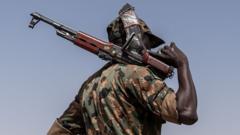The struggle for Sudan's Kordofan region has escalated into a significant front in the ongoing military conflict that has consumed the nation for over two years. Hostilities have surged as both the army and the Rapid Support Forces (RSF) vie for control over this oil-rich area, leading to severe civilian repercussions and amplifying an already dire humanitarian crisis.
Recent attacks in Kordofan have claimed the lives of hundreds of civilians, drawing international attention to the bloody battle unfolding in the three-state region. Analysts emphasize that the victor in this struggle will significantly influence Sudan’s oil supply and the stability of nearby South Sudan, which relies on Kordofan's pipelines for its resources.
Amir Amin, a risk consultant, notes the strategic importance of Kordofan: "Whoever controls Kordofan effectively controls the country’s oil supply, as well as a huge chunk of Sudan." The military, under General Abdel Fattah al-Burhan, seeks to reclaim territory lost to the RSF since June, when the paramilitary forces gained ground, including the capital, Khartoum, and the agricultural state of Gezira.
Khartoum, now under military control, remains devastated from months of conflict. General Burhan's limited return to the capital highlights his precarious position as fighting continues. The war has displaced approximately 12 million people and resulted in an estimated 150,000 deaths, equivalent to a small country's population.
Conflict dynamics have unfolded dramatically since the RSF's unexpected gains, resulting from tensions that erupted in April 2023 when Gen Burhan and RSF commander Gen Mohamed Hamdan Dagalo (Hemedti) turned against each other. Analysts note that control of Kordofan would enhance the RSF's capacity to threaten central Sudan, while the army aims to push further into Darfur, the RSF's birthplace.
Dr. Suliman Baldo from the Sudan Transparency and Policy Tracker casts doubt on the military’s ability to breach the RSF's defenses, especially given that many RSF fighters hail from the local Misseriya community, inspired to protect their own. Airstrikes in West Kordofan have further enraged local populations and exacerbated tensions.
With both sides calculatedly engaging in aggressive military strategies, including threats by the RSF to target key oil-producing regions if airstrikes do not cease, civilian infrastructure remains at severe risk. The UN has condemned these actions, effectively accusing both sides of violating humanitarian law by targeting civilians and essential facilities.
As reports surface of intentional attacks leading to devastating civilian casualties, fears mount that the conflict could escalate further. Reports indicate that the RSF is preparing a major offensive to seize el-Obeid, the crucial capital of North Kordofan. The strategically vital town of Umm Sumaima is currently the last stronghold for the army before reaching el-Obeid, and control over this area could dictate the future course of the conflict.
The battle for Kordofan, covering an extensive area of approximately 390,000 square kilometers, represents not only a military struggle but a fight for survival among civilians increasingly caught in the crossfire. Both factions recognize that this contest could dramatically shift the trajectory of the ongoing war, making it a pivotal moment for Sudan's future.

















